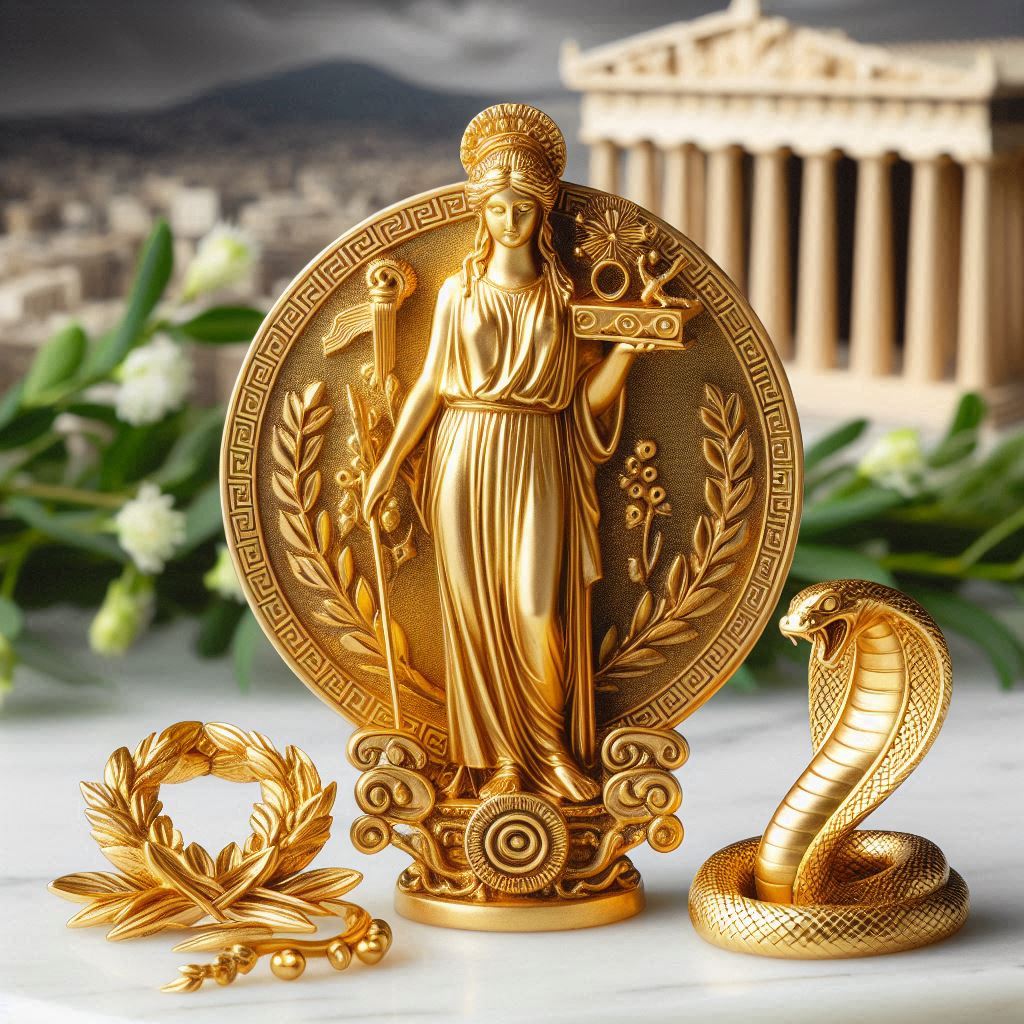Das Orakel von Delphi ist nach wie vor eine der faszinierendsten Institutionen der Antike. Jahrhundertelang hatte es eine einzigartige Machtposition inne und diente als Ort, an dem Sterbliche göttliche Einsicht und Führung vom Gott Apollon suchten. Delphi liegt an den Hängen des Bergs Parnass in Mittelgriechenland und wurde zu einem Ziel für Könige, Philosophen und Herrscher, die die kryptischen Prophezeiungen der als Pythia bekannten Priesterin hören wollten. Lassen Sie uns in die reiche Geschichte, Mythologie und Fakten rund um dieses ikonische Orakel eintauchen.
Inhaltsverzeichnis
- Einführung in das Orakel von Delphi
- Die Rolle der Pythia
- Mythologische Ursprünge
- Der Einfluss des Orakels im antiken Griechenland
- Der Prozess der Befragung des Orakels
- Faszinierende Fakten über das Orakel von Delphi
- Bemerkenswerte Prophezeiungen des Orakels
- Niedergang und Vermächtnis
- Abschluss
Einführung in das Orakel von Delphi
Das Orakel von Delphi ist eines der beständigsten Symbole des antiken griechischen religiösen Lebens. Dieses Orakel im Apollontempel in Delphi galt als das wichtigste aller Orakel der antiken griechischen Welt. Menschen aus allen Teilen des Mittelmeerraums reisten nach Delphi, um die Weisheit der Götter zu suchen, da sie glaubten, dass Apollon selbst durch Pythia, die Hohepriesterin von Delphi, sprach.

Die Rolle der Pythia
Die Pythia, die als Sprachrohr des Orakels von Delphi diente, war von zentraler Bedeutung für dessen Macht. Sie wurde aus den Frauen des Landes ausgewählt, in der Regel älteren Frauen, die vor ihrer Ernennung ein bescheidenes Leben geführt hatten. Während ihres Dienstes inhalierte sie Dämpfe (von denen angenommen wurde, dass sie von der Erde kamen), die sie in einen tranceähnlichen Zustand versetzten. In diesem veränderten Bewusstsein äußerte die Pythia rätselhafte Prophezeiungen, die dann von Priestern für die Bittsteller interpretiert wurden.
Die Rolle der Pythia war eine der wenigen Positionen im antiken Griechenland, in der Frauen bedeutende Macht innehatten, was sie sowohl zu einer verehrten als auch zu einer geheimnisvollen Figur machte.

Mythologische Ursprünge
Die Ursprünge des Orakels von Delphi liegen tief in der griechischen Mythologie. Der Legende nach wurde der Ort ursprünglich von der monströsen Schlange Python bewacht. Apollon besiegte Python in einem erbitterten Kampf und beanspruchte den Ort für sich. Er errichtete dort das Orakel, um seinen göttlichen Willen den Sterblichen mitzuteilen. Der Name „Pythia“ leitet sich von der Schlange Python ab und symbolisiert Apollons Sieg und die Heiligkeit des Ortes.
Delphi selbst galt als Mittelpunkt der Welt. Der Mythos zufolge ließ Zeus zwei Adler von entgegengesetzten Enden der Erde frei, die sich in Delphi trafen und den Ort als „Nabel der Welt“ bezeichneten. Ein Stein namens Omphalos wurde an dieser Stelle platziert, um ihre kosmische Bedeutung hervorzuheben.
Der Einfluss des Orakels im antiken Griechenland
Das Orakel von Delphi war nicht nur eine religiöse Figur; es übte im antiken Griechenland auch enorme politische Macht aus. Menschen aus allen Gesellschaftsschichten suchten den Rat der Pythia, bevor sie sich auf militärische Feldzüge begaben, politische Streitigkeiten beilegten oder wichtige persönliche Entscheidungen trafen. Der Einfluss des Orakels reichte über Griechenland hinaus bis hin zu ausländischen Herrschern und Stadtstaaten, die ihre Führung schätzten.
Griechische Historiker erwähnen häufig den Einfluss des Orakels auf entscheidende historische Ereignisse. So verhalf beispielsweise die Prophezeiung, die dem athenischen General Themistokles vor der Schlacht von Salamis im Jahr 480 v. Chr. gegeben wurde, dem Persischen Reich zum Sieg. Ebenso spielte das Orakel eine Rolle bei der Gründung zahlreicher griechischer Kolonien im gesamten Mittelmeerraum.
Der Prozess der Befragung des Orakels
Die Befragung des Orakels von Delphi war ein formeller und heiliger Vorgang. Bittsteller, ob Könige oder Bürger, reisten nach Delphi und brachten Opfer dar, meist in Form von Tieren, um Apollos Gunst zu erlangen. Anschließend wandten sie sich an die Pythia, die auf einem Dreibein über einem Spalt im Tempel saß.
In ihrem tranceähnlichen Zustand gab die Pythia kryptische Antworten. Die Priester von Delphi interpretierten diese Antworten und übermittelten sie dem Bittsteller. Interessanterweise waren die Prophezeiungen oft mehrdeutig und ließen mehrere Interpretationen zu. Diese Mehrdeutigkeit führte manchmal zu Fehlinterpretationen mit schwerwiegenden Folgen, wie es bei König Krösus von Lydien der Fall war, dessen Fehlinterpretation einer Prophezeiung zum Untergang seines Reiches führte.
Faszinierende Fakten über das Orakel von Delphi
- Delphi galt als spiritueller und politischer Mittelpunkt der griechischen Welt, symbolisiert durch den Omphalos-Stein.
- Moderne Studien legen nahe, dass die von der Pythia eingeatmeten Dämpfe möglicherweise Ethylen enthielten, das einen tranceähnlichen Zustand hervorrufen konnte.
- Das Orakel beeinflusste die Gründung zahlreicher griechischer Kolonien im Mittelmeerraum und im Schwarzmeerraum.
- Die Pythia, eine Frau, besaß in einer von männlichen religiösen Persönlichkeiten dominierten Gesellschaft eine besondere Autorität.
- Der Apollontempel wurde aufgrund von Schäden durch Naturkatastrophen mehrfach wiederaufgebaut.
- Das Orakel von Delphi war über tausend Jahre lang in Betrieb und war damit eine der ältesten religiösen Institutionen der Antike.
- Die Bittsteller mussten beträchtliche Spenden leisten, um das Orakel befragen zu dürfen. Wohlhabendere Personen hatten dabei leichteren Zugang.
Bemerkenswerte Prophezeiungen des Orakels
Das Orakel von Delphi hat im Laufe seiner Geschichte zahlreiche bedeutende Prophezeiungen verkündet. Zu den berühmtesten zählen:
- Die Schlacht von Salamis (480 v. Chr.): Der Rat des Orakels, Athen mit „hölzernen Mauern“ zu verteidigen, wurde von Themistokles als Aufruf zum Bau einer Flotte interpretiert, was zu einem entscheidenden Sieg gegen die Perser führte.
- König Krösus von Lydien: Die Prophezeiung des Orakels, dass ein „großes Reich“ fallen würde, wenn Krösus Persien angreifen würde, wurde missverstanden, da es letztendlich sein eigenes Reich war, das fiel.
- Alexander der Große: Alexander suchte bei seinen Eroberungen die Führung des Orakels und die Erklärung der Pythia, er sei „unaufhaltsam“, bestärkte ihn in seinen Ambitionen.
Niedergang und Vermächtnis
Als das Römische Reich das Christentum annahm, begannen heidnische Tempel, darunter auch das Orakel von Delphi, an Einfluss zu verlieren. Im Jahr 393 n. Chr. ordnete Kaiser Theodosius I. die Schließung aller heidnischen Heiligtümer an, was das Ende der fast 1.000 Jahre währenden Herrschaft des Orakels bedeutete.
Trotz seines Niedergangs lebt das Erbe des Orakels von Delphi in der modernen Kultur fort und beeinflusst Literatur, Kunst und unsere Wahrnehmung antiker religiöser Praktiken. Die archäologische Stätte von Delphi, heute UNESCO-Weltkulturerbe, zieht weiterhin Besucher an, die von ihrer mystischen Vergangenheit fasziniert sind.
Abschluss
Das Orakel von Delphi war mehr als nur eine religiöse Institution; es war eine richtungsweisende Kraft in der antiken Welt. Jahrhundertelang verehrt, beeinflussten seine Prophezeiungen das Schicksal von Nationen, die Entscheidungen von Königen und den Lauf der Geschichte. Umhüllt von Mythen und Geheimnissen bleibt das Orakel ein Symbol für den Wunsch der Menschheit, sich mit dem Göttlichen zu verbinden. Obwohl seine Stimme seit langem verstummt ist, hallen die Echos seiner Prophezeiungen noch immer nach und erinnern uns an eine Zeit, als man glaubte, die Götter wandelten unter den Menschen.



